Assignment on Sociology - The Reggio Emilia
VerifiedAdded on 2022/08/25
|6
|1524
|14
AI Summary
Contribute Materials
Your contribution can guide someone’s learning journey. Share your
documents today.
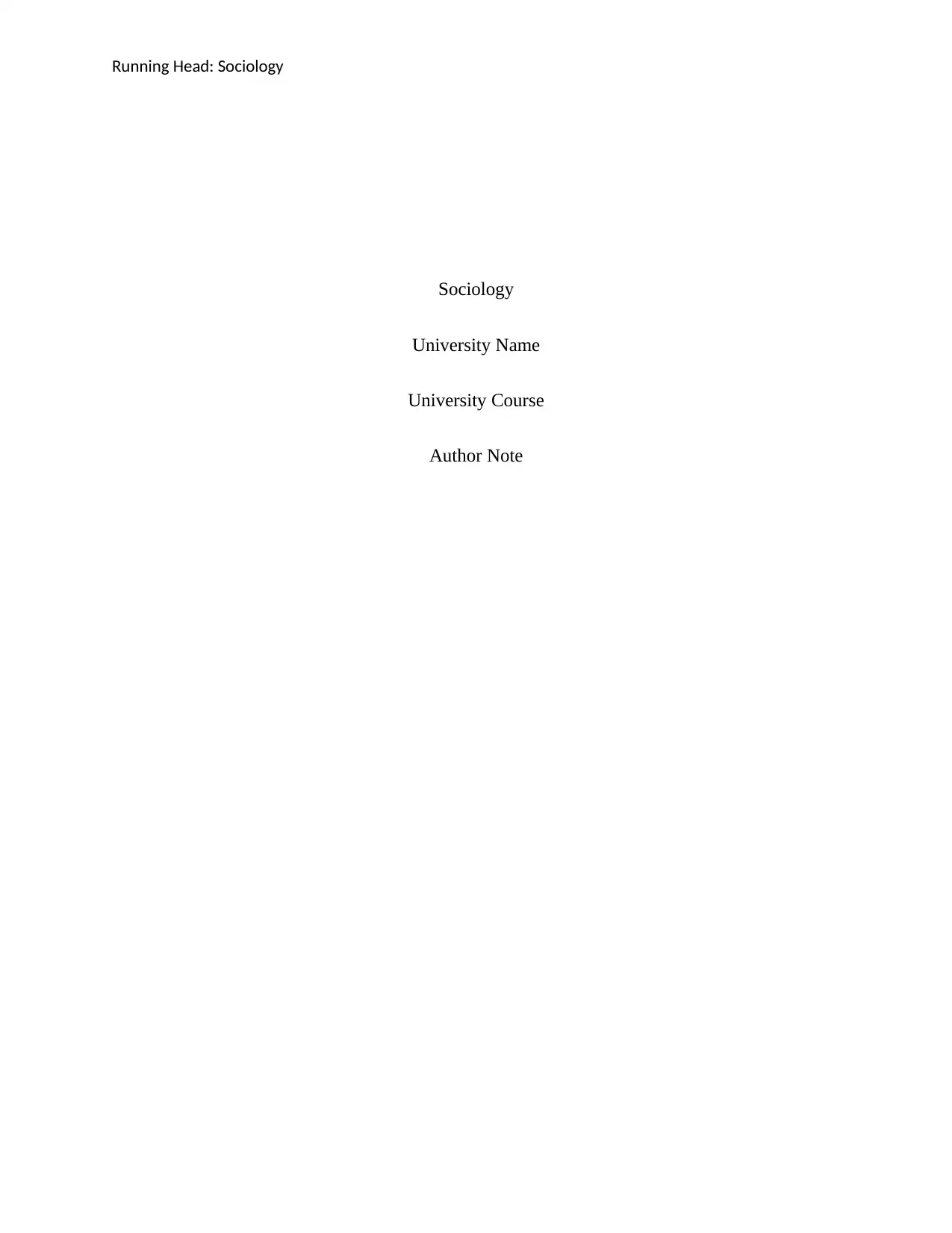
Running Head: Sociology
Sociology
University Name
University Course
Author Note
Sociology
University Name
University Course
Author Note
Secure Best Marks with AI Grader
Need help grading? Try our AI Grader for instant feedback on your assignments.
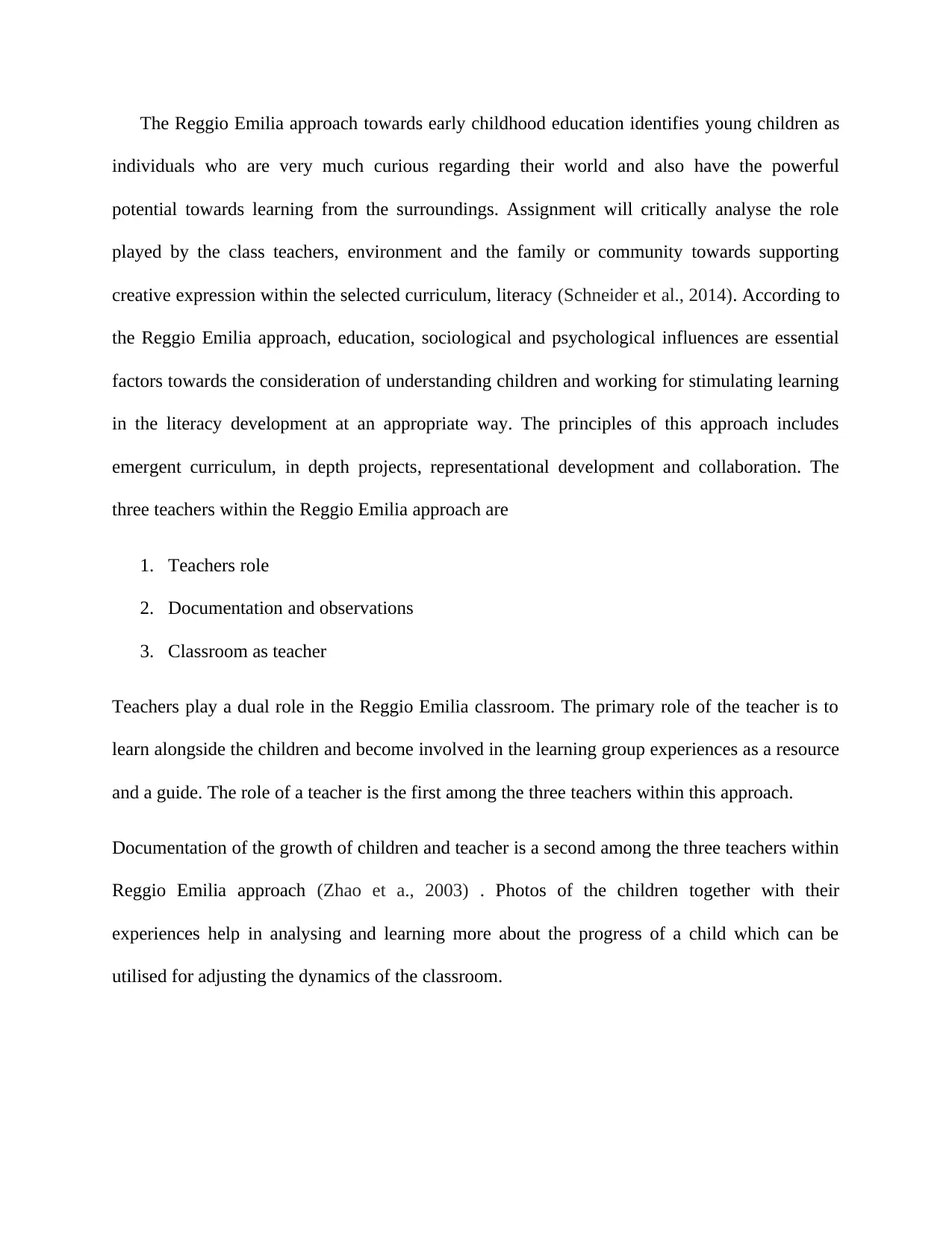
The Reggio Emilia approach towards early childhood education identifies young children as
individuals who are very much curious regarding their world and also have the powerful
potential towards learning from the surroundings. Assignment will critically analyse the role
played by the class teachers, environment and the family or community towards supporting
creative expression within the selected curriculum, literacy (Schneider et al., 2014). According to
the Reggio Emilia approach, education, sociological and psychological influences are essential
factors towards the consideration of understanding children and working for stimulating learning
in the literacy development at an appropriate way. The principles of this approach includes
emergent curriculum, in depth projects, representational development and collaboration. The
three teachers within the Reggio Emilia approach are
1. Teachers role
2. Documentation and observations
3. Classroom as teacher
Teachers play a dual role in the Reggio Emilia classroom. The primary role of the teacher is to
learn alongside the children and become involved in the learning group experiences as a resource
and a guide. The role of a teacher is the first among the three teachers within this approach.
Documentation of the growth of children and teacher is a second among the three teachers within
Reggio Emilia approach (Zhao et a., 2003) . Photos of the children together with their
experiences help in analysing and learning more about the progress of a child which can be
utilised for adjusting the dynamics of the classroom.
individuals who are very much curious regarding their world and also have the powerful
potential towards learning from the surroundings. Assignment will critically analyse the role
played by the class teachers, environment and the family or community towards supporting
creative expression within the selected curriculum, literacy (Schneider et al., 2014). According to
the Reggio Emilia approach, education, sociological and psychological influences are essential
factors towards the consideration of understanding children and working for stimulating learning
in the literacy development at an appropriate way. The principles of this approach includes
emergent curriculum, in depth projects, representational development and collaboration. The
three teachers within the Reggio Emilia approach are
1. Teachers role
2. Documentation and observations
3. Classroom as teacher
Teachers play a dual role in the Reggio Emilia classroom. The primary role of the teacher is to
learn alongside the children and become involved in the learning group experiences as a resource
and a guide. The role of a teacher is the first among the three teachers within this approach.
Documentation of the growth of children and teacher is a second among the three teachers within
Reggio Emilia approach (Zhao et a., 2003) . Photos of the children together with their
experiences help in analysing and learning more about the progress of a child which can be
utilised for adjusting the dynamics of the classroom.
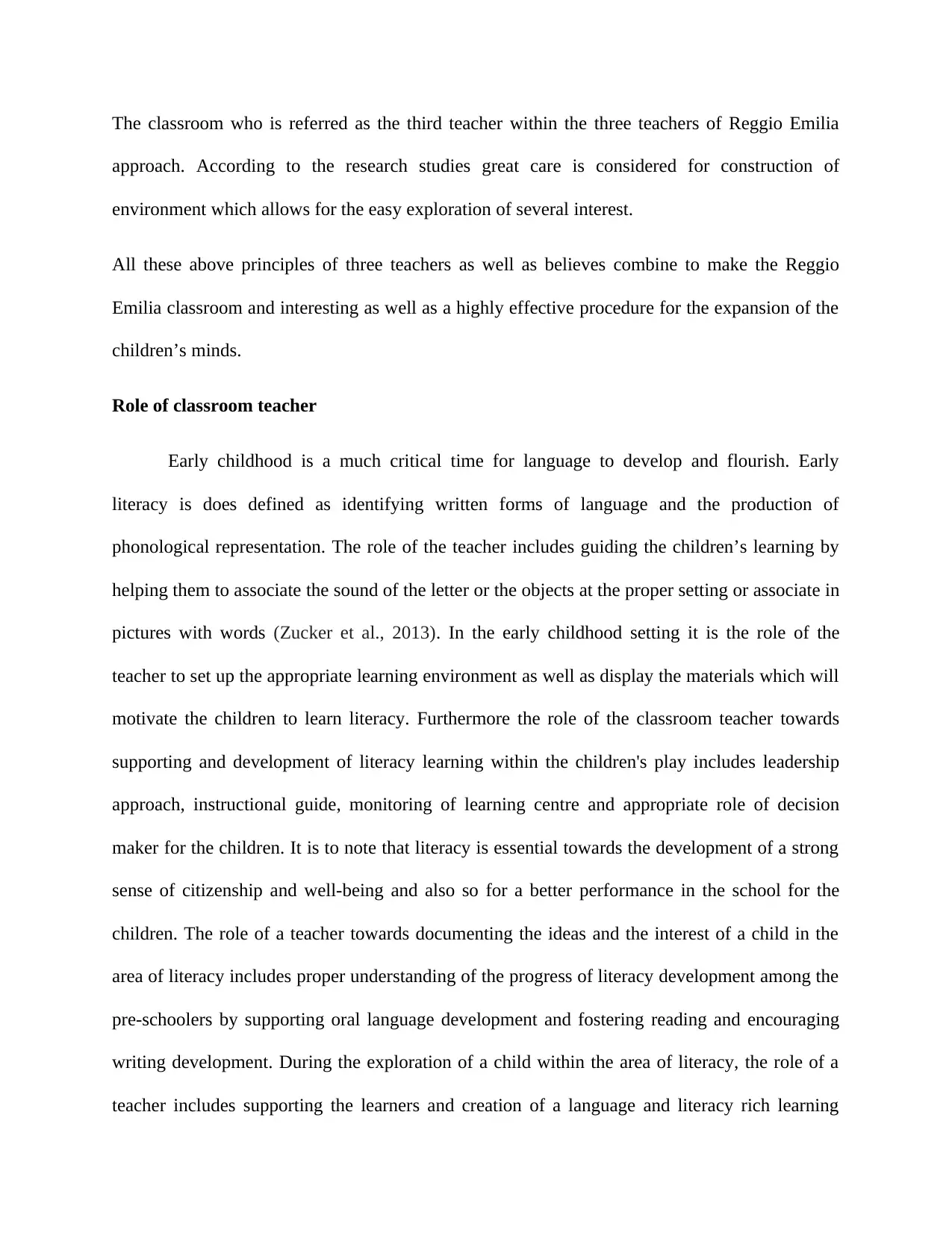
The classroom who is referred as the third teacher within the three teachers of Reggio Emilia
approach. According to the research studies great care is considered for construction of
environment which allows for the easy exploration of several interest.
All these above principles of three teachers as well as believes combine to make the Reggio
Emilia classroom and interesting as well as a highly effective procedure for the expansion of the
children’s minds.
Role of classroom teacher
Early childhood is a much critical time for language to develop and flourish. Early
literacy is does defined as identifying written forms of language and the production of
phonological representation. The role of the teacher includes guiding the children’s learning by
helping them to associate the sound of the letter or the objects at the proper setting or associate in
pictures with words (Zucker et al., 2013). In the early childhood setting it is the role of the
teacher to set up the appropriate learning environment as well as display the materials which will
motivate the children to learn literacy. Furthermore the role of the classroom teacher towards
supporting and development of literacy learning within the children's play includes leadership
approach, instructional guide, monitoring of learning centre and appropriate role of decision
maker for the children. It is to note that literacy is essential towards the development of a strong
sense of citizenship and well-being and also so for a better performance in the school for the
children. The role of a teacher towards documenting the ideas and the interest of a child in the
area of literacy includes proper understanding of the progress of literacy development among the
pre-schoolers by supporting oral language development and fostering reading and encouraging
writing development. During the exploration of a child within the area of literacy, the role of a
teacher includes supporting the learners and creation of a language and literacy rich learning
approach. According to the research studies great care is considered for construction of
environment which allows for the easy exploration of several interest.
All these above principles of three teachers as well as believes combine to make the Reggio
Emilia classroom and interesting as well as a highly effective procedure for the expansion of the
children’s minds.
Role of classroom teacher
Early childhood is a much critical time for language to develop and flourish. Early
literacy is does defined as identifying written forms of language and the production of
phonological representation. The role of the teacher includes guiding the children’s learning by
helping them to associate the sound of the letter or the objects at the proper setting or associate in
pictures with words (Zucker et al., 2013). In the early childhood setting it is the role of the
teacher to set up the appropriate learning environment as well as display the materials which will
motivate the children to learn literacy. Furthermore the role of the classroom teacher towards
supporting and development of literacy learning within the children's play includes leadership
approach, instructional guide, monitoring of learning centre and appropriate role of decision
maker for the children. It is to note that literacy is essential towards the development of a strong
sense of citizenship and well-being and also so for a better performance in the school for the
children. The role of a teacher towards documenting the ideas and the interest of a child in the
area of literacy includes proper understanding of the progress of literacy development among the
pre-schoolers by supporting oral language development and fostering reading and encouraging
writing development. During the exploration of a child within the area of literacy, the role of a
teacher includes supporting the learners and creation of a language and literacy rich learning
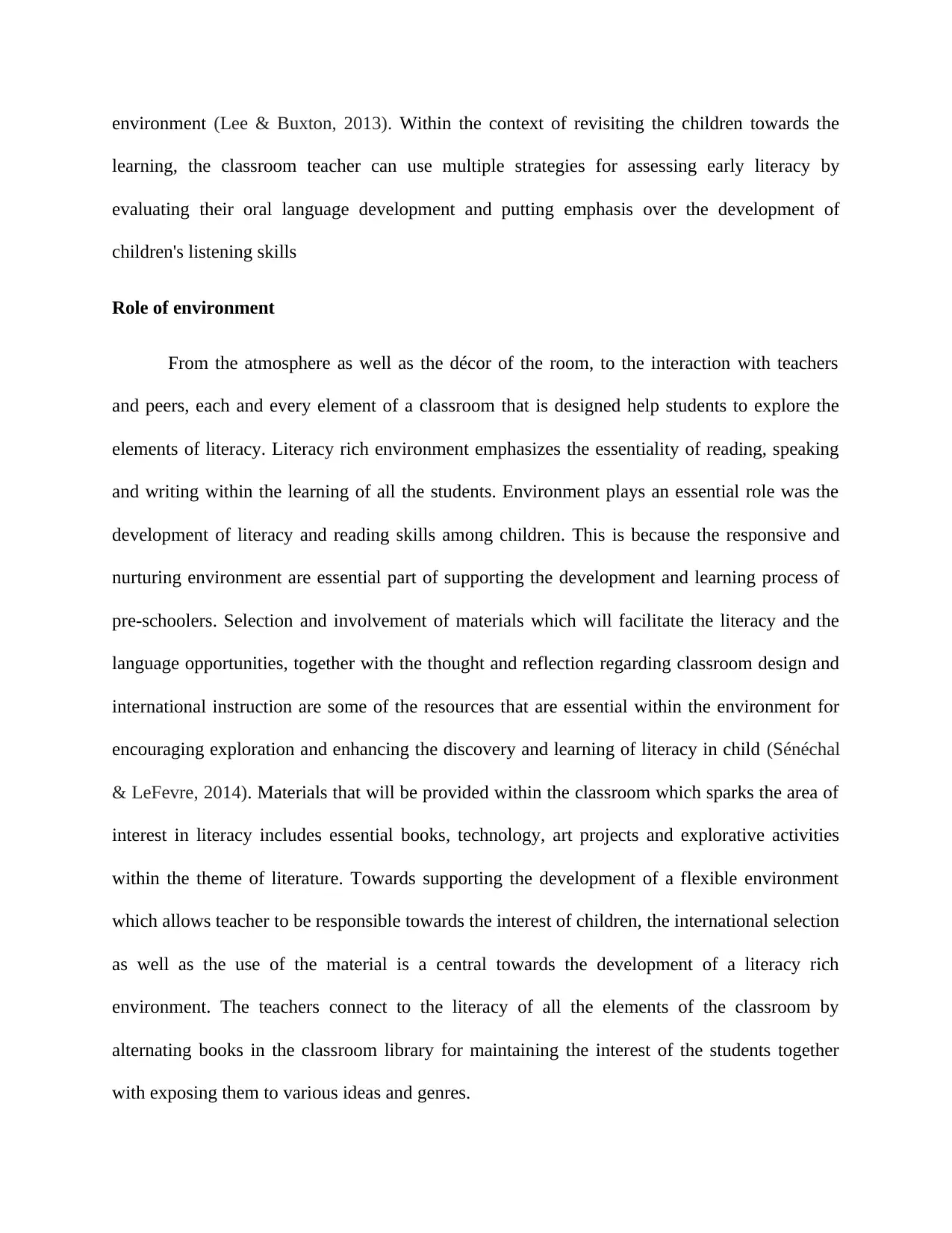
environment (Lee & Buxton, 2013). Within the context of revisiting the children towards the
learning, the classroom teacher can use multiple strategies for assessing early literacy by
evaluating their oral language development and putting emphasis over the development of
children's listening skills
Role of environment
From the atmosphere as well as the décor of the room, to the interaction with teachers
and peers, each and every element of a classroom that is designed help students to explore the
elements of literacy. Literacy rich environment emphasizes the essentiality of reading, speaking
and writing within the learning of all the students. Environment plays an essential role was the
development of literacy and reading skills among children. This is because the responsive and
nurturing environment are essential part of supporting the development and learning process of
pre-schoolers. Selection and involvement of materials which will facilitate the literacy and the
language opportunities, together with the thought and reflection regarding classroom design and
international instruction are some of the resources that are essential within the environment for
encouraging exploration and enhancing the discovery and learning of literacy in child (Sénéchal
& LeFevre, 2014). Materials that will be provided within the classroom which sparks the area of
interest in literacy includes essential books, technology, art projects and explorative activities
within the theme of literature. Towards supporting the development of a flexible environment
which allows teacher to be responsible towards the interest of children, the international selection
as well as the use of the material is a central towards the development of a literacy rich
environment. The teachers connect to the literacy of all the elements of the classroom by
alternating books in the classroom library for maintaining the interest of the students together
with exposing them to various ideas and genres.
learning, the classroom teacher can use multiple strategies for assessing early literacy by
evaluating their oral language development and putting emphasis over the development of
children's listening skills
Role of environment
From the atmosphere as well as the décor of the room, to the interaction with teachers
and peers, each and every element of a classroom that is designed help students to explore the
elements of literacy. Literacy rich environment emphasizes the essentiality of reading, speaking
and writing within the learning of all the students. Environment plays an essential role was the
development of literacy and reading skills among children. This is because the responsive and
nurturing environment are essential part of supporting the development and learning process of
pre-schoolers. Selection and involvement of materials which will facilitate the literacy and the
language opportunities, together with the thought and reflection regarding classroom design and
international instruction are some of the resources that are essential within the environment for
encouraging exploration and enhancing the discovery and learning of literacy in child (Sénéchal
& LeFevre, 2014). Materials that will be provided within the classroom which sparks the area of
interest in literacy includes essential books, technology, art projects and explorative activities
within the theme of literature. Towards supporting the development of a flexible environment
which allows teacher to be responsible towards the interest of children, the international selection
as well as the use of the material is a central towards the development of a literacy rich
environment. The teachers connect to the literacy of all the elements of the classroom by
alternating books in the classroom library for maintaining the interest of the students together
with exposing them to various ideas and genres.
Secure Best Marks with AI Grader
Need help grading? Try our AI Grader for instant feedback on your assignments.
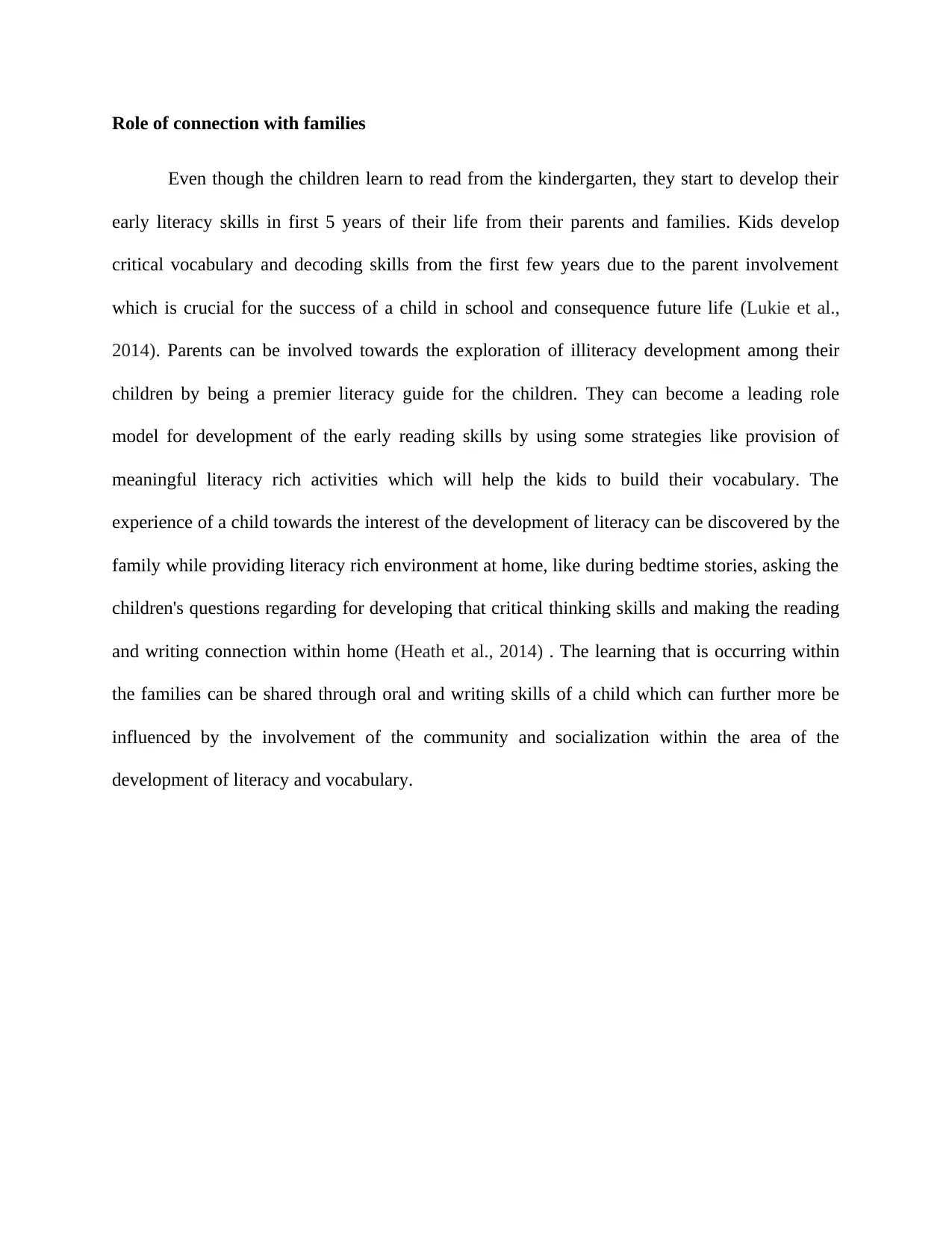
Role of connection with families
Even though the children learn to read from the kindergarten, they start to develop their
early literacy skills in first 5 years of their life from their parents and families. Kids develop
critical vocabulary and decoding skills from the first few years due to the parent involvement
which is crucial for the success of a child in school and consequence future life (Lukie et al.,
2014). Parents can be involved towards the exploration of illiteracy development among their
children by being a premier literacy guide for the children. They can become a leading role
model for development of the early reading skills by using some strategies like provision of
meaningful literacy rich activities which will help the kids to build their vocabulary. The
experience of a child towards the interest of the development of literacy can be discovered by the
family while providing literacy rich environment at home, like during bedtime stories, asking the
children's questions regarding for developing that critical thinking skills and making the reading
and writing connection within home (Heath et al., 2014) . The learning that is occurring within
the families can be shared through oral and writing skills of a child which can further more be
influenced by the involvement of the community and socialization within the area of the
development of literacy and vocabulary.
Even though the children learn to read from the kindergarten, they start to develop their
early literacy skills in first 5 years of their life from their parents and families. Kids develop
critical vocabulary and decoding skills from the first few years due to the parent involvement
which is crucial for the success of a child in school and consequence future life (Lukie et al.,
2014). Parents can be involved towards the exploration of illiteracy development among their
children by being a premier literacy guide for the children. They can become a leading role
model for development of the early reading skills by using some strategies like provision of
meaningful literacy rich activities which will help the kids to build their vocabulary. The
experience of a child towards the interest of the development of literacy can be discovered by the
family while providing literacy rich environment at home, like during bedtime stories, asking the
children's questions regarding for developing that critical thinking skills and making the reading
and writing connection within home (Heath et al., 2014) . The learning that is occurring within
the families can be shared through oral and writing skills of a child which can further more be
influenced by the involvement of the community and socialization within the area of the
development of literacy and vocabulary.
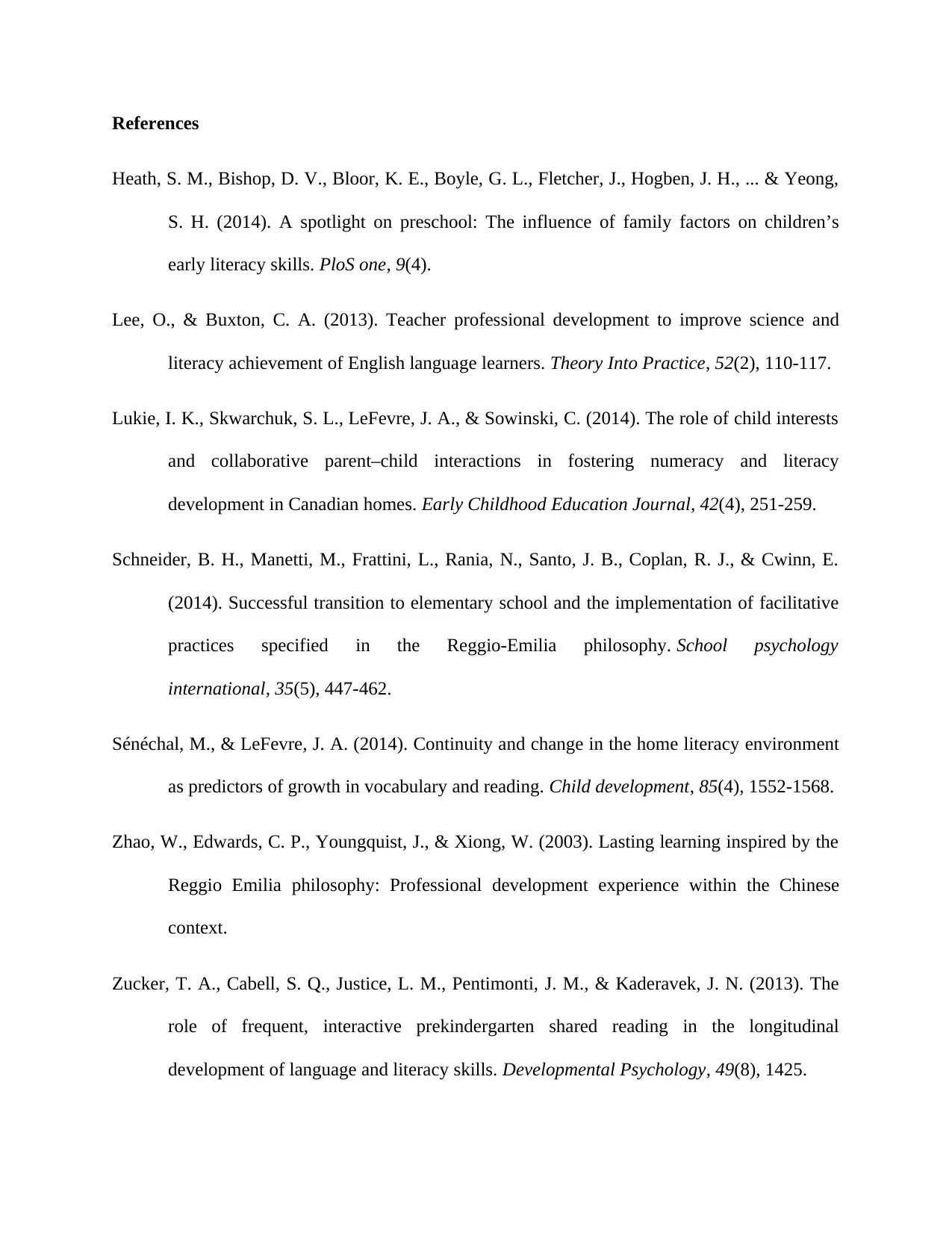
References
Heath, S. M., Bishop, D. V., Bloor, K. E., Boyle, G. L., Fletcher, J., Hogben, J. H., ... & Yeong,
S. H. (2014). A spotlight on preschool: The influence of family factors on children’s
early literacy skills. PloS one, 9(4).
Lee, O., & Buxton, C. A. (2013). Teacher professional development to improve science and
literacy achievement of English language learners. Theory Into Practice, 52(2), 110-117.
Lukie, I. K., Skwarchuk, S. L., LeFevre, J. A., & Sowinski, C. (2014). The role of child interests
and collaborative parent–child interactions in fostering numeracy and literacy
development in Canadian homes. Early Childhood Education Journal, 42(4), 251-259.
Schneider, B. H., Manetti, M., Frattini, L., Rania, N., Santo, J. B., Coplan, R. J., & Cwinn, E.
(2014). Successful transition to elementary school and the implementation of facilitative
practices specified in the Reggio-Emilia philosophy. School psychology
international, 35(5), 447-462.
Sénéchal, M., & LeFevre, J. A. (2014). Continuity and change in the home literacy environment
as predictors of growth in vocabulary and reading. Child development, 85(4), 1552-1568.
Zhao, W., Edwards, C. P., Youngquist, J., & Xiong, W. (2003). Lasting learning inspired by the
Reggio Emilia philosophy: Professional development experience within the Chinese
context.
Zucker, T. A., Cabell, S. Q., Justice, L. M., Pentimonti, J. M., & Kaderavek, J. N. (2013). The
role of frequent, interactive prekindergarten shared reading in the longitudinal
development of language and literacy skills. Developmental Psychology, 49(8), 1425.
Heath, S. M., Bishop, D. V., Bloor, K. E., Boyle, G. L., Fletcher, J., Hogben, J. H., ... & Yeong,
S. H. (2014). A spotlight on preschool: The influence of family factors on children’s
early literacy skills. PloS one, 9(4).
Lee, O., & Buxton, C. A. (2013). Teacher professional development to improve science and
literacy achievement of English language learners. Theory Into Practice, 52(2), 110-117.
Lukie, I. K., Skwarchuk, S. L., LeFevre, J. A., & Sowinski, C. (2014). The role of child interests
and collaborative parent–child interactions in fostering numeracy and literacy
development in Canadian homes. Early Childhood Education Journal, 42(4), 251-259.
Schneider, B. H., Manetti, M., Frattini, L., Rania, N., Santo, J. B., Coplan, R. J., & Cwinn, E.
(2014). Successful transition to elementary school and the implementation of facilitative
practices specified in the Reggio-Emilia philosophy. School psychology
international, 35(5), 447-462.
Sénéchal, M., & LeFevre, J. A. (2014). Continuity and change in the home literacy environment
as predictors of growth in vocabulary and reading. Child development, 85(4), 1552-1568.
Zhao, W., Edwards, C. P., Youngquist, J., & Xiong, W. (2003). Lasting learning inspired by the
Reggio Emilia philosophy: Professional development experience within the Chinese
context.
Zucker, T. A., Cabell, S. Q., Justice, L. M., Pentimonti, J. M., & Kaderavek, J. N. (2013). The
role of frequent, interactive prekindergarten shared reading in the longitudinal
development of language and literacy skills. Developmental Psychology, 49(8), 1425.
1 out of 6
Related Documents
Your All-in-One AI-Powered Toolkit for Academic Success.
+13062052269
info@desklib.com
Available 24*7 on WhatsApp / Email
![[object Object]](/_next/static/media/star-bottom.7253800d.svg)
Unlock your academic potential
© 2024 | Zucol Services PVT LTD | All rights reserved.





